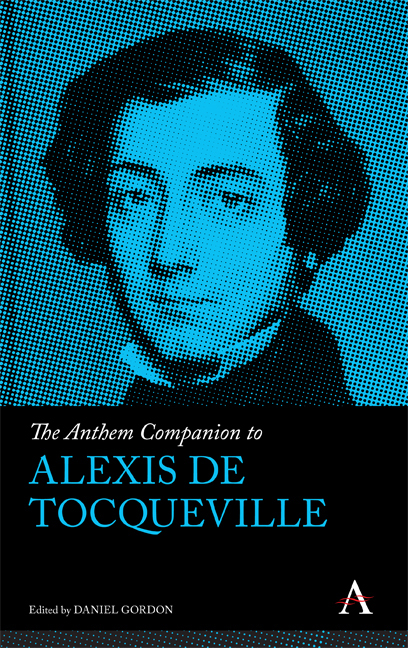Book contents
- Frontmatter
- Contents
- Introduction: Tocqueville and the Sociological Conversation
- A Note on References to Democracy in America
- Part 1 Religion And Immaterial Interests
- Part 2 Language, Literature, and Social Theory
- Part 3 Globalism and Empire
- Part 4 Inequalities Inside Democracy
- Part 5 Citizenship, Participation, and Punishment
- Part 6 An Unfinished Project
- Chapter 11 Tocqueville on the French Revolution
- Notes on Contributors
- Index
Chapter 11 - Tocqueville on the French Revolution
from Part 6 - An Unfinished Project
Published online by Cambridge University Press: 12 July 2019
- Frontmatter
- Contents
- Introduction: Tocqueville and the Sociological Conversation
- A Note on References to Democracy in America
- Part 1 Religion And Immaterial Interests
- Part 2 Language, Literature, and Social Theory
- Part 3 Globalism and Empire
- Part 4 Inequalities Inside Democracy
- Part 5 Citizenship, Participation, and Punishment
- Part 6 An Unfinished Project
- Chapter 11 Tocqueville on the French Revolution
- Notes on Contributors
- Index
Summary
Tocqueville's extraordinary The Ancien Régime and the French Revolution, published in 1856, is a misnomer, since the narrative story of this book ends in early 1789. Considering that Tocqueville is said to have “had a better understanding of the dynamics of revolution than anyone before or since” (Elster 2011, xviii), it is paradoxical, to say the least, that his book has very little to do with the French Revolution, which is ordinarily held to have run from May 5, 1789, and the convocation of the Estates General, to 18 Brumaire (November 8, 1799) with Bonaparte's militarized coup d’état and the end of parliamentary rule.
It is common to praise Tocqueville's study of the origins of the Revolution and to express regret that he died of tuberculosis in 1859 before he was able to finish his intended sequel on the course of the Revolution. Did Tocqueville simply die before finishing the book? Or did he in some sense fail to achieve it? There is a certain irony in Tocqueville's capacity to deliver sequels. He published Democracy in America in 1835, without announcing in that work that a continuation would appear; but he followed up brilliantly with a second volume in 1840. In contrast, in The Ancien Régime and the French Revolution, he explicitly announced his aim to complete his book with a volume on “the vicissitudes of the Revolution.” He even stated that he had already “sketched out” part of the work (Tocqueville [1856] 2011, 4–5). By the time of his death, Tocqueville had assembled more than two hundred pages of handwritten notes on the Revolution, some of them dating from the early 1850s, that is to say, well before the publication of The Ancien Régime and the French Revolution. From these extensive notes, can we see clearly the direction he was taking? Or do we discern instead that he was intellectually unable to complete his history? Tocqueville was undeniably a superb historian. Without seeking to diminish his stature, this essay approaches the missing history of the French Revolution as an indication of the limits of his historical perspective. In brief, Tocqueville's drift, after 1848, from center-left to right, prevented him from fully conceptualizing the French Revolution, which from 1789 to 1794 moved in the opposite direction, from the center-right to the left.
- Type
- Chapter
- Information
- The Anthem Companion to Alexis de Tocqueville , pp. 209 - 226Publisher: Anthem PressPrint publication year: 2019



